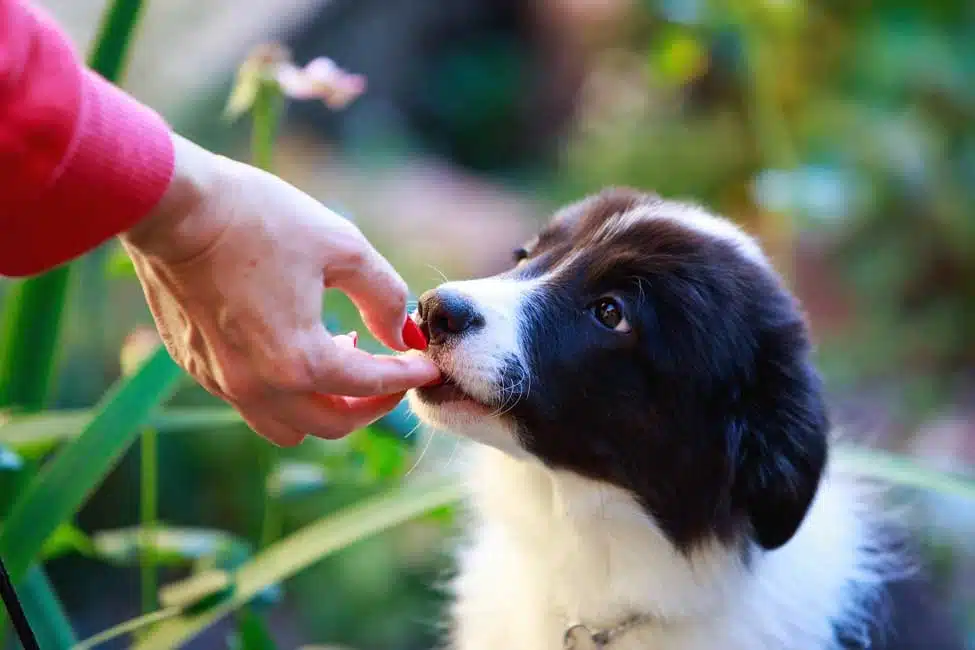
Collies are some of the most well-known herding dogs in all of canine-dom, and it shows from their aerodynamic muzzles to their powerful, low-slung build. They’re made for speed and agility, and the American Kennel Club (AKC) reminds prospective new Collie and Border Collie parents that collie breeds have plenty of energy to spare when it’s time to work or play.
Naturally, when you’re a pup born and bred to burn that kind of energy, you need a food that can keep up – but what exactly is the best food for collie dogs? Aside from daily exercise, your pup’s health depends on a well-balanced diet. For this herding breed specifically, they are used to working long hours in the fields, which means they need enough calories and nutrients to support their overall health and well-being. Kibble that works for one breed might not have the correct balance of nutrients for another, which is why it’s important to do research: your canine companion’s health depends on it. Finding the best dog food for collie dogs starts with understanding this intelligent, ready-to-work breed from their paws up.
A Genetic Dynamo: Energetic Collie Dogs
Even though most US Collies are more likely to spend time chasing squirrels than herding vast flocks of sheep, old genetics die hard. Collies naturally want to sprint across wide distances and practice the fancy footwork their breeds are known for. That’s why agility trial rosters are habitually full of Border Collies, and families with large yards and children love to keep Rough Collies as beloved pets. Their energy levels are ideal for keeping up with younger owners or rigorous training, and they typically live happier lives with these outlets for natural instincts.
The flip side of the Collie coin is that, in the absence of these outlets, less-than-ideal behaviors can crop up. Rough Collies are notorious barkers when they’re bored or agitated over a lack of activity, and Border Collies can chew and dig at inappropriate things like furniture and carpets to alleviate boredom. Neither dog breed is considered a good match for individuals and families that are away from home a great deal or unable to physically interact with their pups on a regular basis. Remember, Collies were bred to work closely with one or more shepherds and will feel lost and upset if they’re isolated from that “pack” mentality.
A healthy living situation for a Collie should include a large area that is safe to run around in, frequent walks 2 or 3 times a day, toys, and owners that are ready and able to live with an energetic, playful dog. In addition to these basic needs, training will also be required: because Collies’ herding instincts are so strong, they will “round up” children, other household pets, and even their owners unless they are taught otherwise.
Collie Health Concerns & Diet
Both Collie breeds – Rough and Border – bring genetic risks to the breeding table, with musculoskeletal problems like hip dysplasia and eye problems like collie eye anomaly. While careful breeding can eliminate some Collie health issues and risks, it can’t remove it entirely without affecting important breed traits. That said, the best action an owner can take outside of working with a reputable breeder is carefully monitoring a dog’s diet and exercise. Hip dysplasia, for example, may not be able to be cured with the right nutrition, but a dog food with a skewed fat/protein ratio could cause obesity that would make the problem worse. A nutrient deficiency could also affect eyesight beyond physical issues, preventing a pup from living their best life despite medical setbacks.
While a loving pet parent might search endlessly for the best dog food for collies, it’s important to remember that dogs are individuals too. When selecting dog food for your Collie, consider these points:
- How active is my dog? While it’s true that both collie breeds are predisposed to running, herding, and exercising, it’s not a guarantee that every pup will relish physical activity. If your collie excels at “holding the couch down” and meanders on their walks, chances are their nutritional needs will not align with, for example, a spritely Border Collie puppy that’s ready to run whenever the wind changes direction.
- How am I monitoring dog food volume? The amount your dog eats – or doesn’t eat – is a huge indicator of overall health. When a collie isn’t feeling well, they’re more likely to leave food in the bowl or eat reluctantly. A kibble-based diet is easiest to precisely measure, both in terms of dishing out a meal and monitoring how much or little is eaten regularly.
- Can my dog eat this easily? While it’s common for a health “incident” to trigger a switch to a higher-quality, grain-free kibble, the choice can be made proactively as well. Ingredient sensitivities or food allergies in collie dogs are often triggered by low-quality commercial dog foods, so smart pet parents can save on vet bills and spare their pooch intestinal discomfort by picking a high-quality pet food from the start. Look for a high-protein, grain-free dog kibble like Lucy Pet Formulas for Life™.
- Is my dog’s food helping dental health? Kibble-based diets are, provided your dog has no significant tooth damage or loose/missing teeth, better for their dental health. The crunching action helps them work their jaws and keeps debris and tartar from building up and causing decay. Other dental measures will still need to be taken of course, but pairing “tooth brushing” type nubbed toys and dental veterinary care with kibble helps establish a holistic approach.
- What does my vet think? Your vet knows a great deal about your Collie’s overall health, and he or she can note potential issues that can be corrected with the right nutrition. Considerations like coat shine and health, skin condition, weight gain or loss, and energy levels should all be discussed during your checkup visit(s). If possible, snap a smartphone picture of the ingredient label and nutritional values of the food you’re currently using prior to your appointment. When you have this information available to share, it will ensure your vet can make an informed recommendation for your pup.
- What does feeding time look like? While nutrition will obviously take center stage in your decision-making process, your daily routines matter as well. Kibble stores easily and works well for free-feeding dogs, but can also be used in conjunction with an auto-feeder for mechanical dispensing if necessary, such as during a long day at work. Wet foods are less easy to keep track of in multi-pet households (e.g. prone to being eaten on the sly by hungry opportunists) and can’t be mechanically dispensed while you’re out of the home.
Timing Is Everything: Feeding Your Collie
With a penchant for high-speed exercise and a fast build, Collies also have another point of “hurry up”: their digestive system. Young Collies, in particular, will eat quickly and digest quickly, which means they also reliably need “outside time” about an hour and a half after eating – potentially a bit sooner if they’re still a puppy. The wait time after they finish a meal is important, as subjecting your dog to strenuous exercises like a run or brisk walk can cause bloat: a painful and potentially fatal issue that can cause the stomach to twist and impede digestion.
With this in mind, free-feeding is a practice best introduced to Collies that are a bit older. A Collie puppy needs structure and training anyway, so building a routine with a precisely-measured amount of kibble at a specific time is a smart move. When your Collie eats at the same time each day, they will have to use the bathroom at the same time as well: this familiarity prevents indoor accidents and puts both human and canine at ease.
Beyond their dish of food, “snacks” can also help support canine health and wellness in your Collie. Nutritionally-balanced dog treats are not only a great training tool for Collies, but they can also help curb those potentially-destructive boredom behaviors mentioned earlier. Protein-rich natural dog treats are a good choice, as they’re free of many of the appetite-wrecking fillers and potentially inflammatory ingredients found in lower-quality treats.
Making The Switch: Upgrading Your Dog Food
Once you’ve decided to introduce a high-quality, grain-free dog food to your Collie’s bowl, it’s important to do it gradually. As a medium-breed dog, Collies may experience more stomach upset and discomfort in an A-to-B switch than their larger counterparts. Rather than simply trading out one food for another, gradually mix the old and new kibble together over a several-day period. This will enable your pooch’s digestive system to adjust to the new, higher-quality ingredients and give them time to adjust to taste and texture as well.
The benefits of using the best food for Collie needs are lifelong ones: more energy, a beautiful coat, and balanced nutrition to keep them strong and healthy. As one of the most important steps in safeguarding your Collie’s health, precisely-formulated kibble from the Lucy Pet Formulas for Life™ line offers both peaces of mind for you and a delicious (and nutritious) meal for your pup.
Sources Cited:
- “Collie.” American Kennel Club (AKC.org), no publish date, https://www.akc.org/dog-breeds/collie/. Accessed December 15, 2019.
- “Border Collie.” American Kennel Club (AKC.org), no publish date, https://www.akc.org/dog-breeds/border-collie/. Accessed December 15, 2019.
- Rosenthal, Cathy M. “5 things dog owners shouldn’t do.” mySA (mysanantonio.com), Sunday, June 19, 2011, https://www.mysanantonio.com/news/article/5-things-dog-owners-shouldn-t-do-1427667.php. Accessed December 15, 2019.
- “The Lucy Pet Formulas For Life™ Solution.” Lucy Pet.com, (no publish date) https://www.lucypetproducts.com/formulas-for-life. Accessed December 15, 2019.
- Collie vs. Border Collie: https://www.lucypetproducts.com/blog/collie-vs-border-collie
- Most Common Border Collie Health Issues: https://www.lucypetproducts.com/blog/common-collie-health-problems




Leave A Comment
You must be logged in to post a comment.